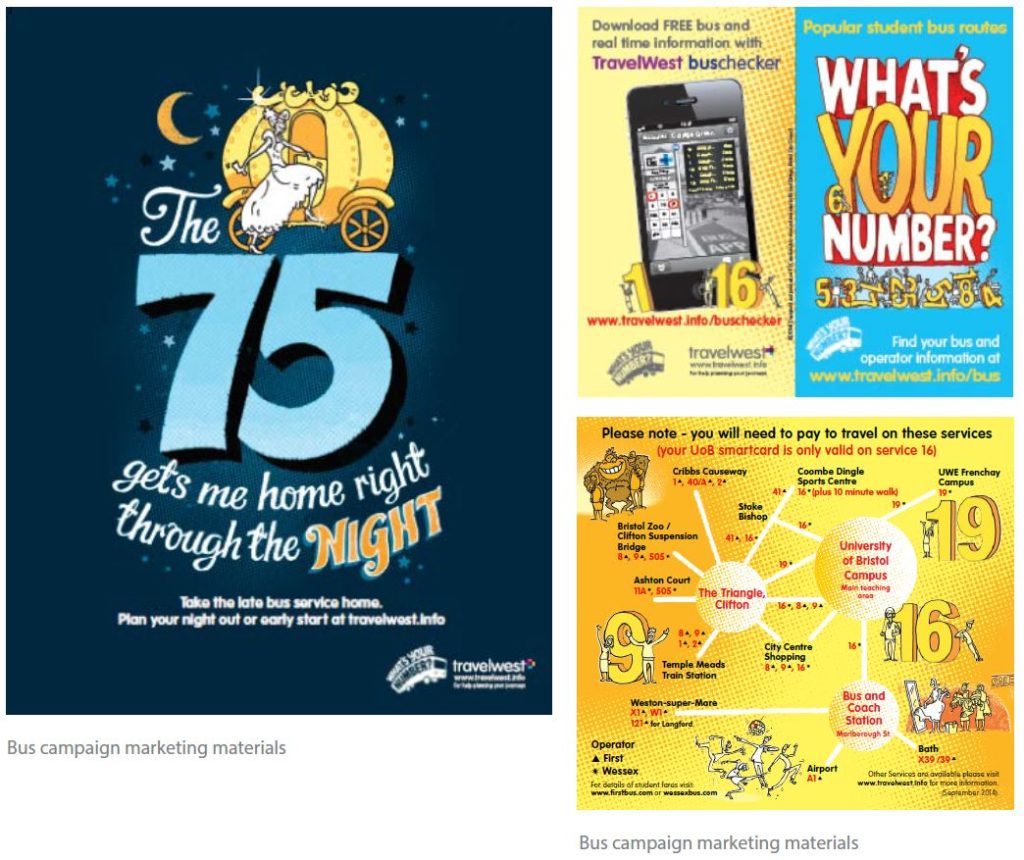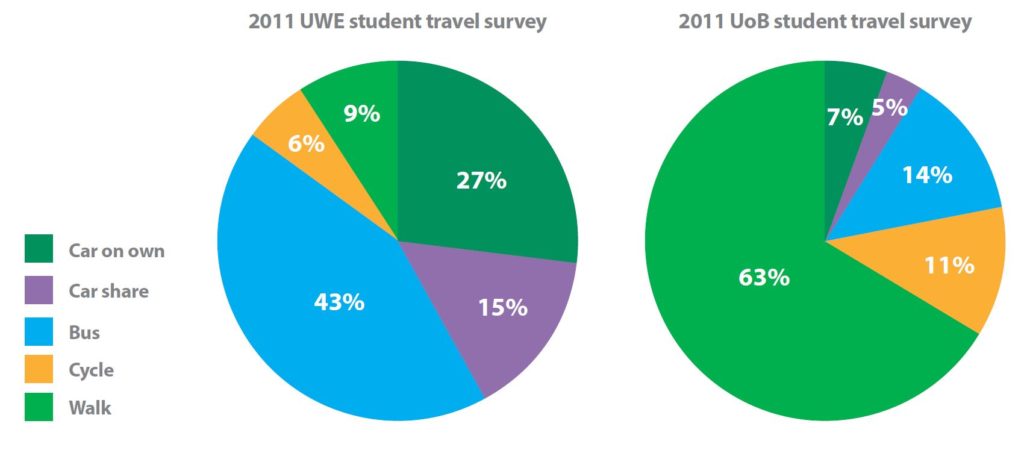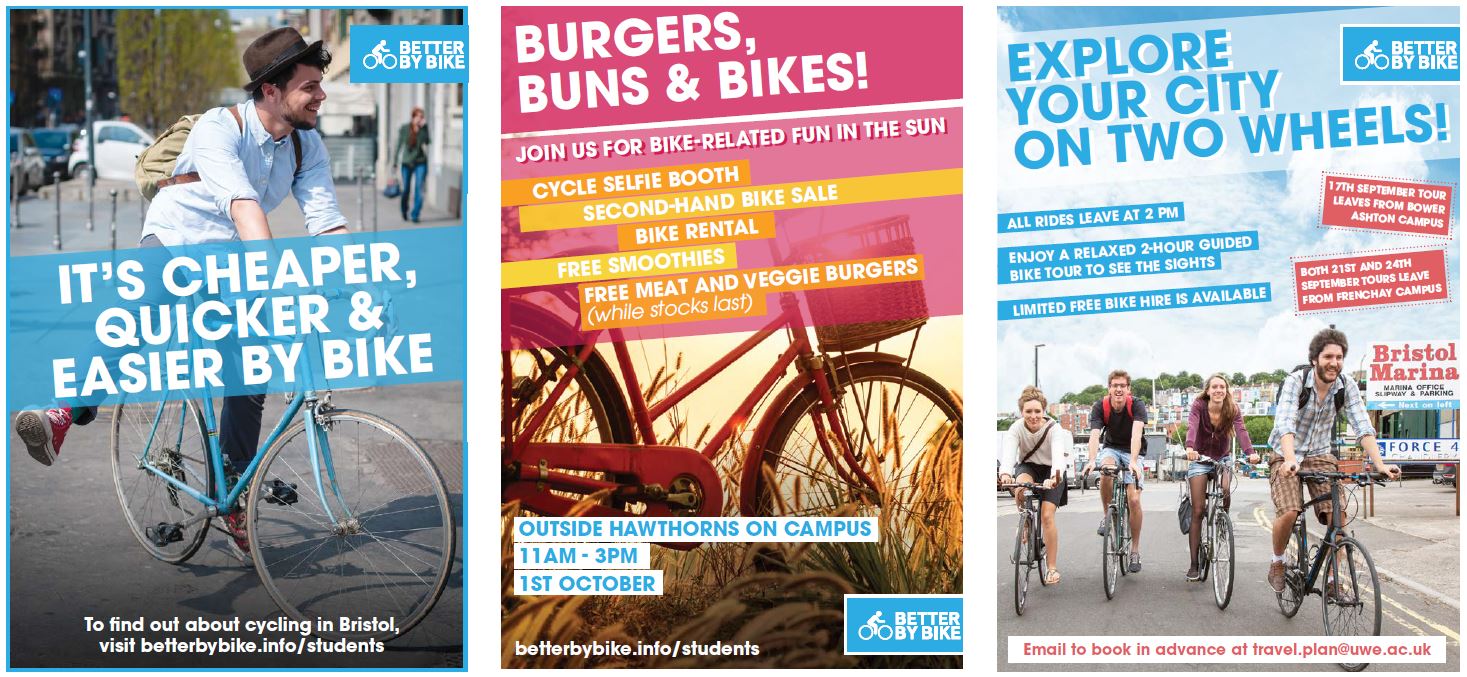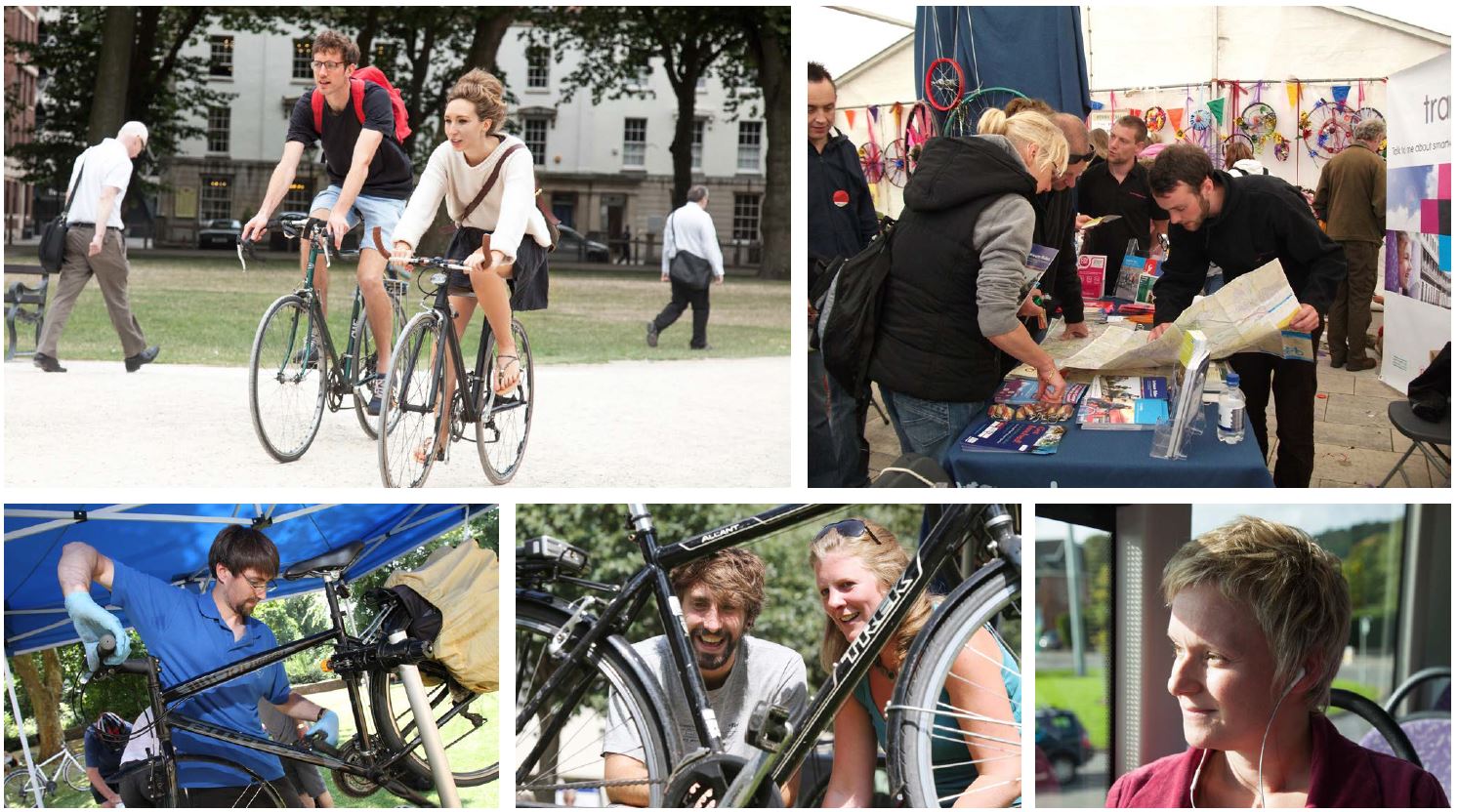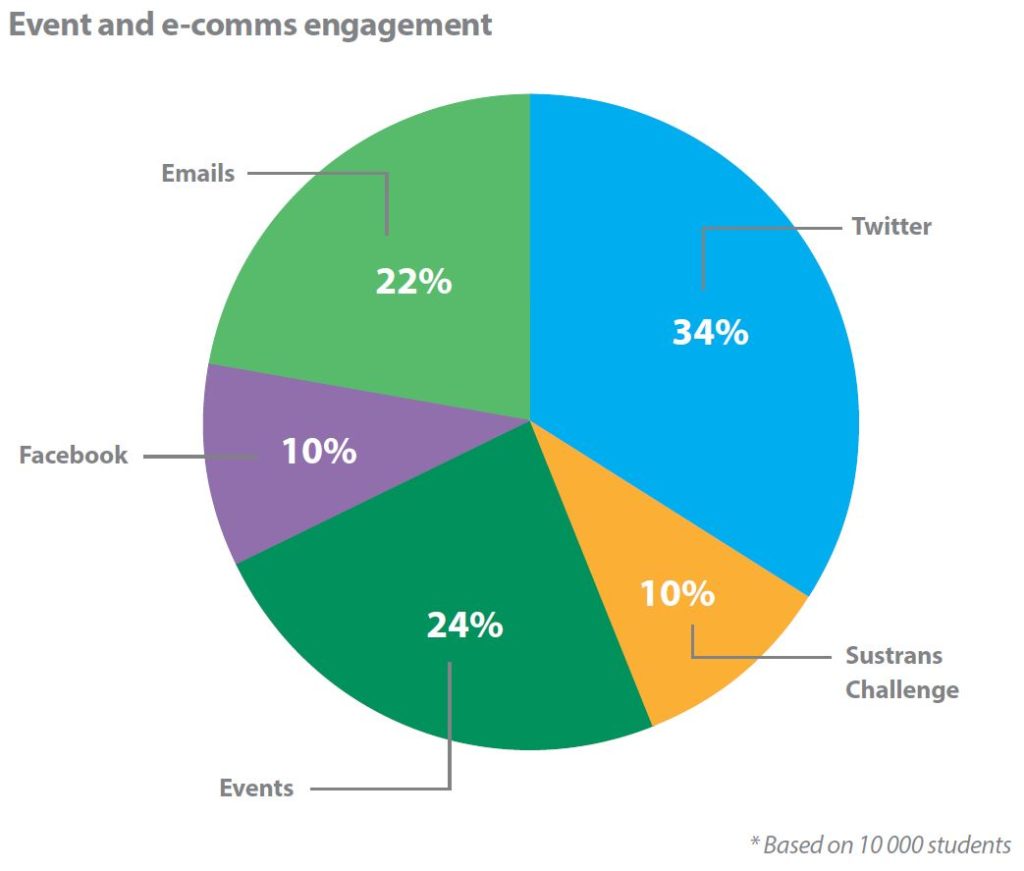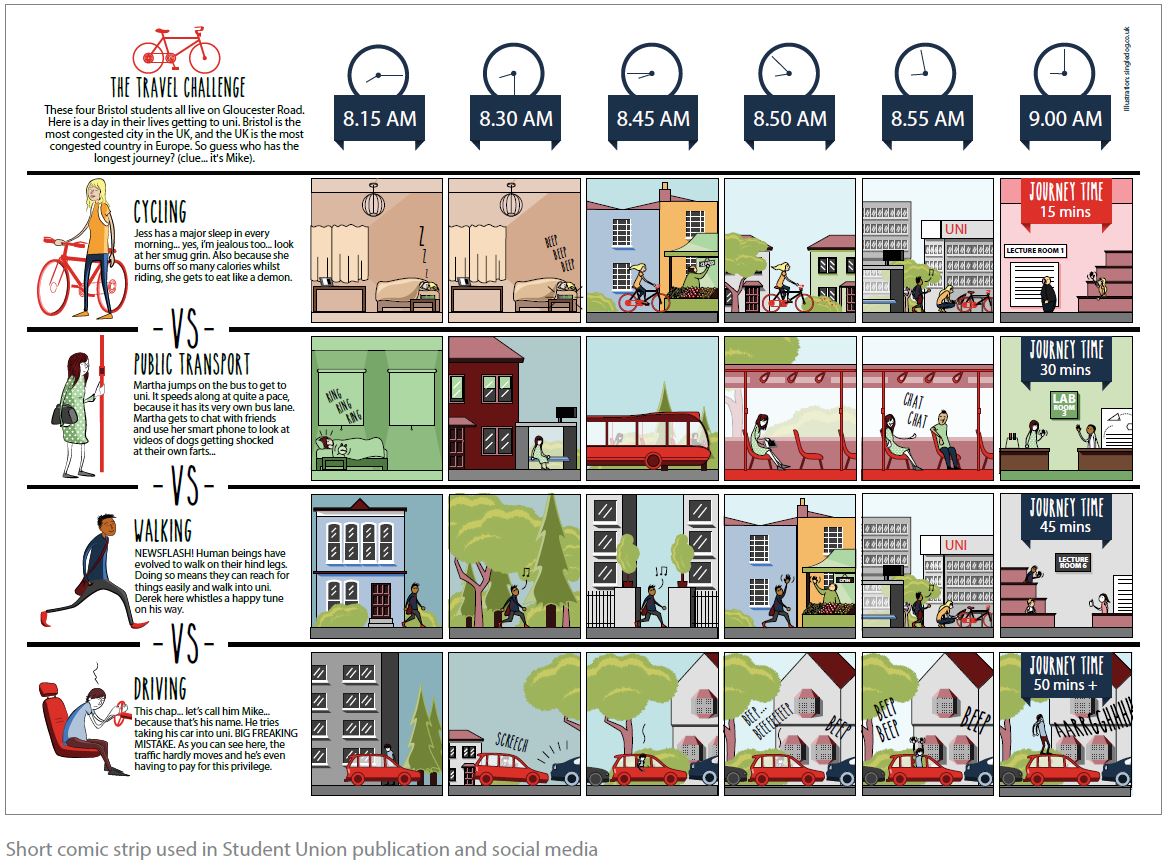Campaign Implementation
Background Information
This section reviews the lessons learnt from the travel marketing campaign implemented at both The University of the West of England (UWE) and The University of Bristol (UoB) in 2014.UWE and UoB have contrasting levels of transport mode use. Given existing measures and the large number of students living within a 5km radius of university, encouraging the uptake of cycling was identified as the greatest opportunity.
UWE background
The University of the West of England is a post-1992 university with over 27,000 students spread between 3 campuses. The main campus is Frenchay approximately 6 miles from the centre. Some students live in halls on campus, but the majority of Bristol based students live around 3-5 miles out. The student population has a relatively high proportion of part-time, vocational and mature students, and students living outside of Bristol.
To encourage sustainable travel UWE has helped develop & subsidise a network of buses to service campuses and student areas and 1st year students in halls receive an inclusive bus pass. This has led to a steadily increasing use of the bus, to the point where services can be severely overcrowded at peak times. Student car use has been historically high, but new policies phased from 2013 (a parking exclusion zone based on home address) will significantly reduce this proportion. Active travel is relatively low.
University of Bristol background
The University of Bristol is a red brick university with over 21,000 students. The main campus is in the heart of the city, with one small satellite campus in North Somerset. The majority of students live within walking or cycling distance and there is a substantial population of 4000 mainly 1st year students in Stoke Bishop which is around 2 miles out.
A university bus service runs from Stoke Bishop to The University and experienced high demand. First year students in halls also receive an inclusive bus pass, which mainly benefits Stoke Bishop students, with Clifton and City Centre based halls not being located on the bus route. Active travel levels are high due to proximity and the many pleasant routes between student areas and the main campus, however cycling levels are only just above the city average and have scope for increase. Often capacity for cycle parking does not keep up with demand, and there is a large investment program to increase this.
Campaign Overview
Objective
To encourage the use of sustainable travel among students. The marketing campaign largely focused on the promotion of cycling, with some additional emphasis on bus use at UoB. Both universities also used unbranded messages around car use and ownership.
Communications Strategy
The marketing campaign for first year students was made up of two parts;
- Pre-arrival (April – Sept 2014) – messages delivered through emails, social media and online
- Post-arrival (Sept – Oct 2014) – face-to-face events, champions, social media, portals
The aim of the pre-arrival messages was to reach students before they made key decision points eg buying a car or leaving their bike at home. The intention was to try and reach students with campaign messages multiple times to gain more impact.
The post-arrival element focused on the first 4-6 weeks of term; considered key for determining travel habits. This can be a difficult time for communications as there are so many competing pressures for a student’s attention.
Audience
Incoming first year students (a key transition point). All three segments (social normal, safe travellers, freedom seekers) were targeted with both generic and targeted messages.
Time and Budget
The travel marketing campaign was supported by the same social marketing agency that completed the insights report. The budget of £30k included planning, design, print & creation of materials and implementation. There were about 7 months between kick-off to the end of the campaign.
Branding and Marketing Design
The existing Better By Bike brand (owned by the West of England partnership) was chosen to be used for all cycling based marketing. The brand was popular in pretesting, was a good fit with students and already has wide recognition in the region. It was decided that marketing for other modes would be unbranded, as there was insufficient time and budget to easily develop an overarching travel brand for either university.
Marketing posters promoting campaign messages, social events, and cycle training
The chosen tagline was ‘it’s cheaper, quicker & easier by bike’ which tested well and contains important messages to emphasize as suggested through the insights report. Most of the images show people on bikes enjoying themselves, but importantly not going too fast or portrayed in dangerous looking situations (which had tested badly). This pre-testing, supported by the research on perception of cycling and barriers is also the reason few of the images showed cyclists where helmets or special cycling clothing.
Photos
Many of the main campaign images that pre-tested well were taken from Shutterstock for a small fee, and local photos have been largely used for social media and online purposes.
Tips
-
- Where possible use local images, sourced from others or from your own photo-shoots.
- Arrange for volunteers to attend photo-shoots, and consider paying students to ensure attendance.
- With the best intentions, you may not get the quality of photos you were hoping for. An alternative is buying high quality images online, and may even be cheaper than a photoshoot.
- Some complaints were received due to lack of helmets in the photos (an emotive issue). You may want to include helmets in some images, but try and avoid making cycling look dangerous or scary which can be counter-productive.
Communication Channels
The most important part of marketing is being able to communicate effectively with the audience. This means identifying appropriate communications channels for the messages. An exhaustive list of communications channels was made for the two universities by consulting with key stakeholders. This was narrowed down by prioritising on cost and effectiveness (see the communications channel matrix in section 1)
Segmentation
E-comms channels provide a very cost effective way of reaching a wide audience, and the messaging approach was to target multiple segments through the e-comms channels.
E-comms
E-mails
Emails were used to reach students before they arrived to university using a couple of different channels. It can be difficult to get approval for mass emails, so check this early.
- Marketing emails – marketing teams at both universities capture huge email circulation lists of prospective students (between 20-30,000 for each university), and monthly/quarterly emails are sent up to 10 months prior to start date.
- Accommodation emails – At both of the universities, the accommodation teams had separate communications to the marketing team or any other department. There are several communication channels including web info, application process, acceptance letter/email and follow-up information emails.
Tips
-
The findings showed a very high opening rate, but low click through rate for the specified web pages. This suggests web links cannot be solely relied on; key, concise information in the body of emails is also important.
-
Work with relevant stakeholders to send 2 or 3 emails to students pre-arrival. The CRM/marketing teams and accommodation are useful partners. Sending information early around car policy, buses, cycling or walking can help set expectations and support desirable travel behaviour ie bringing less cars and more bikes.
The style should be informed by the content and objective – ie the marketing messages used aspirational images/stories around cycling. The accommodation emails used plain text, no pictures and a more authoritarian tone requesting detailing restrictions on car parking & ownership.
Social Media
Twitter and Facebook were experimented with extensively and have been shown to be very useful tools, albeit potentially time consuming unless used smartly. Followers have consistently grown over the last year and perhaps more importantly vast numbers can be reached when content is shared by active members for example student unions.
Tips
-
The development and use of social media is incredibly fast, with big changes occurring over the two years of this project. It is likely the approach outlined in this toolkit will be will be out of date relatively quickly.
-
Whilst the value of social media can often be overstated, this has undeniably been a valuable channel. Face to face events have had a big positive impact from social media activity. It is a year round channel and one of the few which can be owned and operated by the travel/sustainability team.
-
Unless making use of social media advertising (this can be very cost effective at gaining new followers and getting messages out), this activity will be free. It is however potentially time consuming, but if used smartly it should take up less than an hour per week. Posts can be scheduled in advance and updates and images can be added via mobile on the go.
Web Sites
Both universities have travel web pages with extensive amounts of information. However there are restrictions in terms of content, branding, imaging and video opportunities.
To increase the potential reach and to give opportunities for more creative, branded content, it was decided to explore additional web opportunities. The two Student Union marketing teams were happy to host content and in UWESUs case a micro-site..
BetterByBike.info/students – The new student section of the Better By Bike site is intended to hold campaign messages, images, & videos. However, launch was delayed for the main campaign period, coming online only in December 2014.
The benefits of using the BBB site in addition to existing university travel pages are;
- Additional flexibility & use of BBB branding
- Another route to display campaign messages
- Links to a wealth of useful information about cycling
Portals
Both universities have 3 different portals, all of which have huge usage;
- Admissions portal/VIP Portal – this is pre-arrival and holds messages and info about applying for courses/accommodation and coming to Bristol
- Student portal – to access internal email, students need to first log-in to MyUWE or MyBristol portals. These portals have the ability to display short targeted or mass messages.
- Blackboard – home to specific faculty/course information and not always appropriate for travel information
Short messages were used on the first two portals to very good effect (ie bring a bike to uni, fill in surveys, sign-up to events). There is a limited word count and pictures are not an option. As an example for travel survey completions this gave us over 400 responses.
E-Communications Lessons Learnt – One of the clearest findings from the trials of e-communications is that students do not all find information in the same way, and often multiple communications channels can complement each other. To reach the widest range of students it is useful to use emails, web info, social media and portals. This will be detailed in the communications plan as part of the final toolkit.
Where possible, support across the university should be found so that additional e-communications channels can be utilised and reach extended For instance, internal social media accounts or additional email distribution lists/newsletters. See section 6 for partner packs.
Events
The literature on travel behaviour change shows the face-to-face approach can be a very cost effective. To deliver this to every new student or to book in one-to-one sessions is unrealistic. An alternative approach is to put on travel events targeted at new students to deliver key travel info and often a form of condensed PTP. Many of the events and case studies were tailored to specific segments such as ‘bike tours’ targeting Safe Travellers. This will be highlighted later in the section.
Events Pack
An events pack was designed so that all events could be given a clear branding and look and draw people in. An events pack was designed with a range of materials created to support cycle based events. This included BetterByBike branded bunting, balloons, badges, a cycle-selfie booth and printed t-shirts for volunteers.
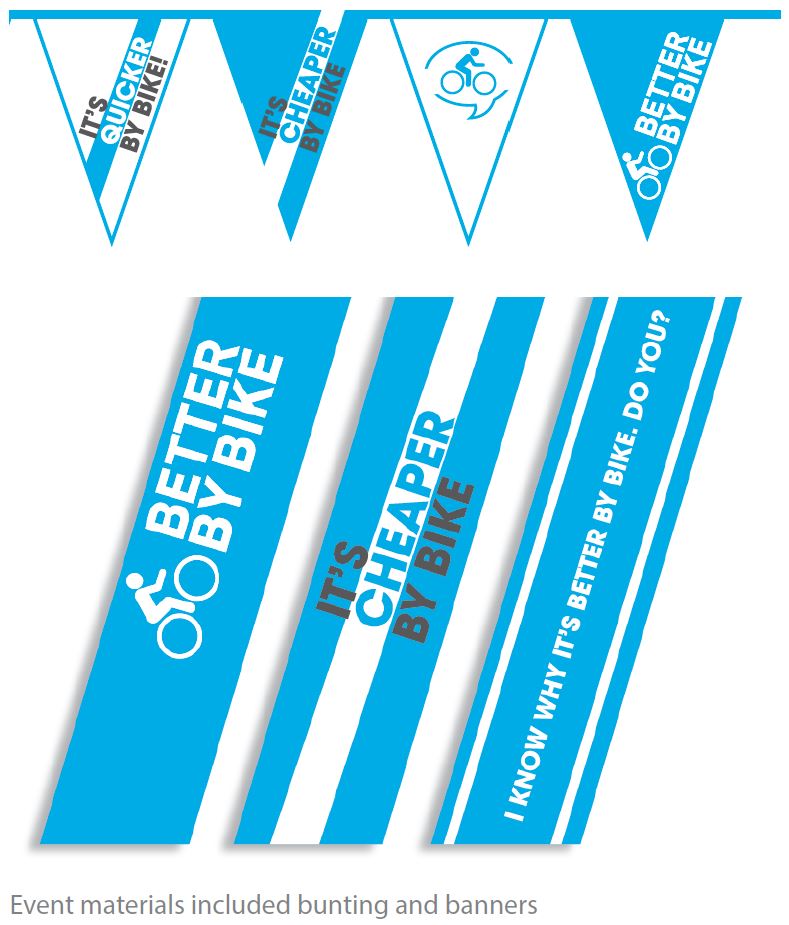
Travel Roadshows
One of the key forms of events were travel stalls/roadshows using internal staff and the Travel Roadshow team. These events were held mainly during the first few weeks of the academic year at areas with high footfall. It is a great way to engage people in conversation to deliver face-to-face advice and offer maps and services. The Travel Roadshow team were able to offer free cycle training, free taster bike loans bus advice and cycling and public transport route advice and taster tickets. Freshers fairs were avoided however, as these environments were found to be too hectic to allow quality conversations. If you are in the West of England check TravelWest.info to see if the roadshows are available to be booked. If delivering this solely in-house it may require a lot of preparation, sourcing of maps & travel materials to be successful.
BetterByBike BBQ
This event targeted the Safe Travellers and Social Normals segments.
This event was designed to create a buzz and draw in people who would not
ordinarily interact with us at events. The concept was to focus entirely on cycling as opposed to the roadshow events which are general travel. The event was billed as a bike ‘fair’ including a free BBQ (requiring interaction with travel advisors for a voucher), Dr Bike, 2nd hand bike sale, travel roadshow, bike hire, smoothie bike and a cycle selfiebooth.
The design of the event was to fit in with the fun freshers atmosphere at the start of term and compete with the many compelling student events.
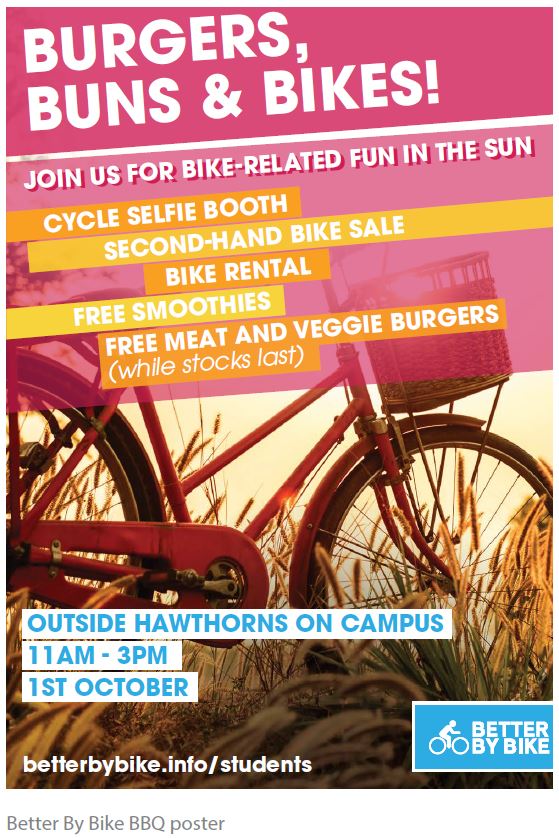
TIPS
This format proved hugely popular, and helped create a buzz around the
messages. ‘Free’ Food in general and the BBQ in particular is very popular
around Freshers week. Vouchers should be handed out on the travel stall once the student has been engaged in conversation about travel if possible or signed up to an event or service. Back-up staff and student volunteers are recommended to ensure enough support on the day. By making use of the events pack with bunting, ballons, t-shirts and badges, the branding and the messages were very clear.
Bike Tours & Bike Hire
This event targeted the Safe Travellers and Social Normals segments.
The idea of bike tours are to encourage students to give cycling a go with the offer of a free tourist sightseeing adventure. Getting people to give cycling a go (tagline of Bike Tour: Brunel, Banksy & Boats). A pool of bikes were made available that could be loaned out for each tour. The rides doubled as a cycle taster event and helped give confidence for cycling on road.
TIPS
Although small scale, this provides a wonderful opportunity to engage with students providing cycling skills, confidence, and allowing in depth conversations around travel. The tours were particularly appealing to international students who did not have their own bikes. Potentially this could be offered through Student Unions or Sport Centres at the universities. Although fully subscribed in advance, the tours were less popular at UWE, with many drop-outs. One option is to charge a nominal sum to reserve a place
Partner Communications Pack
It was established early on that the means of communicating with students in large universities is hugely decentralised, with diverse communications channels owners spread across the institution. A high number of these channel owners are willing to support sustainable travel messaging for various reasons. For this purpose a Partner Communications Pack was developed taking shape of a folder containing examples of printed materials from the campaign and a CD containing resources.
Examples of communications partners include the web team, accommodation teams, the student union, international office, marketing team and the sport centre. The pack explains that partners can use the pack in two ways;
- Distribution – making use of photos & messages for emails or web pages. This has proved popular already with the SU and marketing for the annual prospectus.
- Adaptation – using this as a starting point to work with the travel team to tailor the messages towards their audience. For instance, there have been conversations with the UoB International Office about adjusting the messages to their prospective Asian audience to help set expectations about how to travel in a foreign country.
Case Studies
Several other initiatives and trials were launched during the project. The following case studies expand on these
I am text block. Click edit button to change this text. Lorem ipsum dolor sit amet, consectetur adipiscing elit. Ut elit tellus, luctus nec ullamcorper mattis, pulvinar dapibus leo.
Travel Challenge – online platform
This initiative targeted – the Social Normals segment.
Overview
UWE & UoB participated in an online Travel Challenge aimed at encouraging and promoting sustainable travel whilst competing with the other university. The platform was provided by Sustrans and the challenge was part funded by the West of England authorities. The challenge lasted for one month, and encouraged students and staff to sign-up, log journeys and to gain prizes.
Challenge Stats
- 1313 Sign-ups
- c750 active users
- 14,000 journeys logged
- UoB – 2% participation
- UWE – 1% participation
- 50 messages & 97 photos posted to the portal
TIPS
Lessons learnt – Sep/Oct best time but busy and difficult to resource.
An online ‘challenge’ tool can be a useful tool for engaging students and staff, which can appeal to both competitive and community focused personality types. Good feedback was received in terms of encouraging modal change, and developing social norms for sustainable travel. Can be time intensive to launch successfully and is difficult to engage the key 1st year demographic. Several providers in the market, some with compelling cycling only platforms.
Cost – Upto £10k
Cycle Lease Scheme Trial
This initiative targeted – the Social Normals and Freedom Seekers segments.A limited trial (40 bikes across 4 halls) was implemented offering students the opportunity to exchange their inclusive bus pass for a bicycle. This trial is thought to be the first of its kind in the UK. The participants were offered a bike of an equivalent value of a bus pass, plus 15 days’ worth of ‘rainy day’ bus travel plus a cycle accessories pack.
The aim of the scheme was twofold;
- to encourage cycling behaviours at a key transition point to reduce car dependency at a later date
- to reduce the pressure on university subsidised bus services
Evaluation showed around 1/3 of participants were classed as new cyclists and would not have cycled if not for the scheme. Around 2/3 of participants were likely to have brought their own bike and cycled regularly without the scheme.
TIPS
Due to various limitations the design of the scheme was flawed, however this trial showed that a cycle lease scheme could make a useful contribution in encouraging cycling behaviours. In particular this could appeal to harder to reach groups such as international students & less confident cyclists. This model however only works where there is an inclusive ‘free’ bus pass to students. More details on cycle scheme options in attachment
Costs – the cost per bike including set-up, maintenance and cycling accessories was £340
Yr 2 Move to Private Accommodation
This initiative targeted – Safe Travelers, Social Norms, Freedom SeekersIn the rush to secure private accommodation in the 2nd year, some students end-up agreeing to properties in relatively inaccessible areas or find they have no bicycle storage. To provide an early nudge to students to consider travel choices UWE worked with a private letting agency. The company incorporated new travel features to their website.
The first step was to add a traffic light system on the front page for any of the uploaded properties. This gave a red, amber or green symbol for bus, bike and walking.
The second step was to create a map showing relevant bus services and the location of the property that was being viewed. Contact TravelWest.info to see if they can provide support in this area.
Bike Maintenance Services
This initiative targeted – the Social Normals, Freedom Seekers, and Safe Travellers segments.A big barrier for ongoing cycling is mechanical failure, and students not having the money or confidence to repair and maintain their bikes. UoB has successfully held Dr Bike sessions offering free repairs to staff & students for around 5 years. It is now a fortnightly offering in the same place which has developed strong demand year round. In a typical year 600 bikes checked and repaired, which helps keep people cycling.
Learning from the UoB example, UWE has developed a weekly Dr Bike session gaining great publicity and feedback in the process.
Cost – Around £150-£200 for one mechanic for 4 hours
Mapping & Signage
A problem identified, particularly at UWE is that people don’t know or can’t visualise a pleasant cycling journey to Frenchay Campus. Despite huge investment in cycle paths & greenways, very few people know about them. Building on the example of signage of a Bath walking network, a UWE centric cycle map was created in conjunction with South Glos council. There are just 4 simple routes one of which has been signed at junctions using lamp-post stickers. Over 4000 maps were given out to UWE students.
The Speed Problem
This initiative targeted – the Freedom
Seekers segment.As outlined in the insights report, UWE students in particular tended to overestimate the speed of driving to university and underestimated the speed of cycling. The perception of speed is an important motivator for choosing which mode of travel to use, so this was identified as an area of focus.
The below comic was created as an eye catching means of communicating the results of the annual commuter challenge – which is a race between commuters of different modes to Frenchay Campus. The challenge has been held for several years, with compelling results, but it has proved difficult to get the message out widely.
Bus Campaign
This initiative targeted – the Social Normals and Safe Travellers segments.
Working with Bristol City Council some student focused bus communications were created using the ‘What’s your number campaign’. The aim was:
- To be destination focused and fun
- To promote the bus checker app
- To create an eye-catching poster to promote night bus use and the Travelwest website
